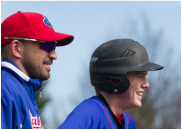FOCUS ON THE PROCESS: When players are preoccupied with the outcome (hits, wins, runs, etc), they tend to go away from the things that make them successful. Hitters start to press when they come up with the bases loaded and swing at bad pitches. Players have difficulty finding positives in games that they lose or they do not learn from games they win. Hitters try to do too much when they are in a slump even though they have been hitting the ball hard. To combat all of this it is useful to focus players on the key things they need to do to be successful. For example, teams will score runs and win games if they put together quality at bats consistently throughout a game (hit line drives, see 6 or more pitches, move runners over, get into hitters counts, etc.). Rather than become frustrated and press when they don't score runs off (what players may feel) is a weaker pitcher, try to encourage them to trust their hitting approach and continue to grind out each at bat rather than look for the "5-run home run". This also allows teams to see a large number of small victories rather than only one large victory (winning a game/tournament)
What can you do?
-Ask you child/team HOW their at bats went, not how many hits they got. Did they hit the ball hard? Did they get themselves into hitters counts?
-Ask your child/team if they made quality pitches on the mound, not how many strike outs or whether he won. Did they throw consistent strikes? Did they use their off-speed pitches effectively?
-Ask your child/team questions around effort and how hard they competed. How was their preparation? These are all parts of the process...positive outcomes will follow.
FOCUS ON WHAT YOU CAN CONTROL: No matter how hard players try, they really have no impact on the umpire, other players, the weather, or where a defense plays you when you hit. So don't let them waste their energy worrying about it. In my 12 years of coaching I have never seen an umpire change a strike call. Arguing about it decreases our team's chances of learning from the situation and we are less likely to adapt our strike zone to increase our chances of being successful. The same goes for balls that you hit hard - you have no control over whether a play is made or not so worry about what you can control. Take care of the strike zone and do your best to square a ball up - after that it is out of your hands!
What can you do?
-Avoid yelling at umpires as this promotes players focusing their energy on something they can't control. Players sometimes use fan reactions as a way to justify their feeling that he/she was "right" and was the VICTIM of a bad call. No learning will come from this scenario.
-Effort and compete level are ALWAYS within a players control - encourage these characteristics
STAY IN THE PRESENT: We all lose confidence (a mental state based in the PAST; developed from lingering thoughts about stike outs, errors, etc) and we all get nervous sometimes (a mental state based on worrying about an outcome sometime in the FUTURE), but the more we can focus on what is happening right now and the process required to execute that skill, the more confident and relaxed we are.
What can you do?
-Chose more "directive" cheering; phrases like "come on guys" or "lets go" (usually right after an error and in that pleading tone we all hear around the ball park) focuses players on a past mistake or some big moment in the future.
-Try phrases that reward effort and focus players on now; "best swing right here" or "next pitch" (after a bad swing or close strike call) or "another quality pitch and a ball in play" (after an error). Help players learn from situations and move on quickly.
PHYSICAL ERRORS ARE DIFFERENT THAN MENTAL ERRORS: As coaches and parents we need to understand that physical errors happen. Balls will be dropped, batters will be walked, hitters will chase pitches over their head, and fielder's will throw balls away. These things happen. The difference (and often the subjective judgement from coaches) is whether mistakes are made because players are unprepared, not focused, or not willing to give maximum effort. A good example is the difference between a ground ball going through a fielders legs (physical) and a fielder throwing to the wrong base (mental). Did that base runner get picked off because he wasn't paying attention or because he slipped?
What can you do?
-Before games encourage players to maximize effort. This needs to be the identity of EVERY team and it is contagious!
-After poor performances ask players questions around their preparedness and compete level.
-Help players understand that physical errors are part of the game and are learning experiences. Learn from them as best you can and move on.


 RSS Feed
RSS Feed